MORGANTOWN — Viatris announced Friday that its predecessor Mylan has won a lawsuit filed by competitor Sanofi that alleged Mylan employed anticompetitive tactics to snuff out Sanofi’s failed EpiPen rival Auvi-Q. Sanofi sought up to $11.7 billion in damages in the suit.
Sanofi filed the suit in 2017 in the U.S. District Court for the District of Kansas. The judge rendered summary judgment against Sanofi on Thursday but temporarily sealed the orders explaining his ruling. Both sides have until Jan. 13 to contest unsealing the orders, which are set to be unsealed on Jan. 15.

The only public document on the ruling says Sanofi recovers nothing on its claim.
Viatris – formed by a merger of Mylan and Upjohn – said Friday it’s pleased with the ruling.
“For the past three years,” Viatris said, “Sanofi, one of the world’s largest pharmaceutical companies, has unjustly pursued money damages and attempted to blame Mylan for Sanofi’s own failures in marketing Auvi-Q. The court’s favorable judgment should put an end to this attempt by Sanofi to advance a false narrative against Mylan and to use the antitrust laws to punish, rather than promote, competition.”
Case background
Sanofi based its dollar demand on estimated lost profits during Auvi-Q’s first brief appearance on the market, plus lost profits for the time since — $3.9 billion total — with antitrust law triple damages applied.
EpiPen and Auvi-Q are both epinephrine auto-injectors. EpiPen was launched in 1980; Mylan began marketing it in the U.S. in 2007.
French firm Sanofi launched the Auvi-Q in 2013. Unlike the tube-shaped EpiPen, the Auvi-Q is about the width and length of a credit card and as thick as a cell phone. Mylan officials had previously said the EpiPen had an 85% market share through most of 2015.
Sanofi recalled the product and took it off the market in November 2015 because of technical problems with the dosage system. When Sanofi withdrew Auvi-Q, EpiPen’s share reached 95%.
In 2016, Sanofi returned Auvi-Q’s rights to developer Kaléo, which brought it back to market in February 2017.
Sanofi alleged that Mylan erected a number of artificial barriers to stifle competition, including rebates to commercial insurers, pharmaceutical benefits managers and states on the condition they not reimburse for Auvi-Q prescriptions; misclassifying EpiPen to federal and state Medicaid agencies, allowing it to under-reimburse those agencies for EpiPen sales and use the savings to fund the rebate plan; and locking competitors out of schools by conditioning its EpiPen4Schools program on exclusive use of EpiPens.
Sanofi said its U.S. market share fell from 13% at the end of 2103 to just 7% in 2014.
Mylan filed its own counterclaims, alleging Sanofi was the one to engage in anticompetitive conduct.
It noted that when it acquired the EpiPen in 2007, there was little awareness of anaphylaxis risk and doctors often prescribed ineffective products to address allergic reactions. Mylan spent millions educating the medical community and the public and making the EpiPen available to schools.
But Sanofi undertook a campaign to besmirch the EpiPen and mislead the healthcare community and the public, Mylan said Sanofi falsely advertised the Auvi-Q as the “new EpiPen,” more patient friendly, safer, easier to carry and use. Its agents allowed some providers to infer that EpiPen was phasing out of the market.
Auvi-Q sales staff sometimes threw away EpiPen materials in medical offices and replaced it with their own, Mylan said. At least one sales staffer offered providers cash kickbacks for prescribing Auvi-Qs. This staffer was not fired, but transferred, implying Sanofi approved of the conduct, and the conduct was more widespread.
Viatris announced last week it is closing its Morgantown plant by July 31.
Tweet David Beard@dbeardtdp Email dbeard@dominionpost.com




